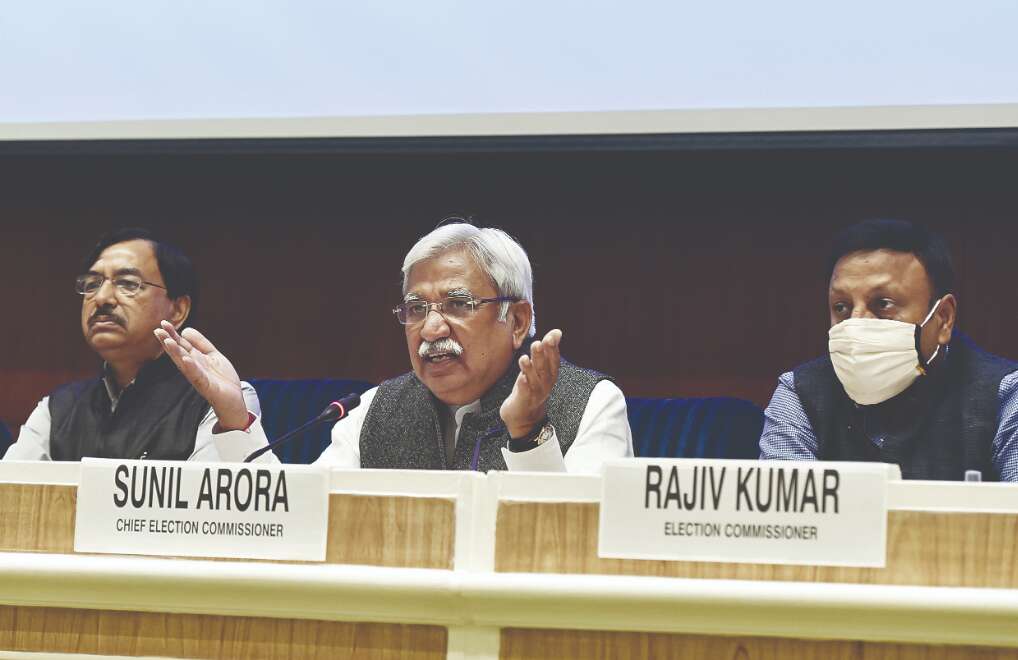Polls in five states begin on March 27, results on May 2

New Delhi: The stage is set for a fierce electoral battle in the states of West Bengal, Assam, Kerala, Tamil Nadu and Union Territory Puducherry as the Election Commission on Friday announced the poll schedule for Assembly polls in the four states and the one UT. The voting for five Assembly elections will begin on March 27 and counting of votes for the four states and one UT will be done on May 2.
As many as 18.68 crore voters will be eligible to cast their votes at 2.7 lakh polling stations for 824 Assembly seats across Assam, West Bengal, Kerala, Tamil Nadu and Puducherry.
The elections in four states and one UT is seen as a litmus test for BJP and its opponents — mainly Congress — as the saffron party is leaving no stone unturned to win a 'significant' number of seats in all the poll-bound states and UT. In a surprise move, the Commission announced that Assembly elections for 294 seats in West Bengal will be held in eight phases – one more than the last Assembly poll.
Apart from West Bengal, the other state that will have more than one phase polling is Assam as the voting in the BJP-ruled north-eastern state will be conducted in three phases starting from March 27, April 1 and end on April 6, while polling in Kerala, Tamil Nadu and Puducherry will take place in a single phase on April 6.
Notably, it will be the first Assembly election in Tamil Nadu after the death of M Karunanidhi and J Jayalalithaa as both the leaders had a towering presence over the politics in the state.
While announcing the poll schedule, Chief Election Commissioner Sunil Arora said, "Elections for the West Bengal Assembly will be held in eight phases, up from seven last time, beginning with polling for 30 seats on March 27."
The second phase of West Bengal's Assembly elections has been scheduled for April 1 and will cover 30 constituencies, followed by the third phase on April 6 for 31 seats, the fourth on April 10 for 44 constituencies, the fifth on April 17 for 45 seats, sixth for 43 seats on April 22, seventh phase on April 26 for 36 seats and last and eighth phase on April 29 for 35 seats, Arora said, adding that the EC will appoint two special observers for West Bengal and a third can also be sent if required.
Voting will take place for 126 seats in Assam, 234 in Tamil Nadu, 294 in West Bengal, 140 in Kerala and 30 in Puducherry. Arrangements will be put in place for candidates to file their nominations online. Voting will be allowed for an additional hour, keeping in mind COVID-19 safety guidelines, he said.
All critical and vulnerable areas have been identified and advance teams have been already deployed across the four states and one union territory, he said, adding that door-to-door campaigning will be restricted to five persons, including the candidate, while roadshows will be allowed with a maximum of five vehicles.
Trinamool Congress and many other Opposition parties questioned the rationale behind eight phases in West Bengal even though the CEC said it is "not such a big deal" as last time, there were seven phases.
The CEC said when the EC assesses the law-and-order situation, the assessment is based on several factors. "Afterall the elections to West Bengal (assembly) in 2016 were in seven phases. The Lok Sabha was in 7 phases. So, 7 to 8 (phases) is not such a big deal because we also have to see the movement of forces, we also have to see the current charges and counter-charges (by political parties). "We have to kind of find a way out. That is why we are sending two expenditure observers to Tamil Nadu and two police observers to West Bengal," Arora explained.
Arora, who will demit office on April 13, also said all must be congratulated for the successful conduct of elections in Bihar last year despite the COVID-19 challenges and he is confident of success once again.



